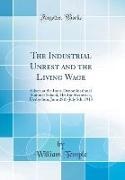Read more
Excerpt from The Industrial Unrest and the Living Wage: Given at the Inter-Denominational Summer School, Held at Swanwick, Derbyshire, June 28th-July 5th, 1913
United Summer School is published by the Collegium, and I am asked to set before its readers the origin, nature, and purpose of the Summer School and also the nature and the aim of the Collegium.
The United Summer School was held at Swanwick this year, as it also was last year, under the auspices of the Inter-denominational Conference of Social Service Unions. This Conference consists of delegates from the various Social Service Unions of the different Christian denominations; its Chairman is the Bishop of Oxford; its aim is to bring into the work of the several unions as much co-operation and unity as is found practicable; thus, for example, the Conference recommends to the unions represented at it a subject of study for each year. This is not the place to enlarge upon what is implied in the mere existence of such a body, but plainly it is significant of the new temper. Twice the Conference has called together a Summer School where people of all denominations meet for the consideration and discussion of some large social question. This volume is a report of the addresses given at the second Summer School.
As a result of the discussions at the Summer School of 1912, a group of people came together and decided to make the attempt to form a body of Christian people drawn from all denominations which should be the means of focussing and expressing Christian opinion on the broad principles of social progress.
About the Publisher
Forgotten Books publishes hundreds of thousands of rare and classic books. Find more at www.forgottenbooks.com
This book is a reproduction of an important historical work. Forgotten Books uses state-of-the-art technology to digitally reconstruct the work, preserving the original format whilst repairing imperfections present in the aged copy. In rare cases, an imperfection in the original, such as a blemish or missing page, may be replicated in our edition. We do, however, repair the vast majority of imperfections successfully; any imperfections that remain are intentionally left to preserve the state of such historical works.

